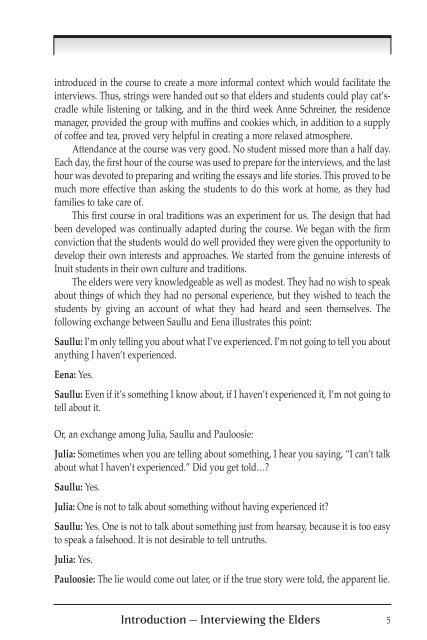Introduction-E
Introduction-E
Introduction-E
Create successful ePaper yourself
Turn your PDF publications into a flip-book with our unique Google optimized e-Paper software.
introduced in the course to create a more informal context which would facilitate the<br />
interviews. Thus, strings were handed out so that elders and students could play cat’scradle<br />
while listening or talking, and in the third week Anne Schreiner, the residence<br />
manager, provided the group with muffins and cookies which, in addition to a supply<br />
of coffee and tea, proved very helpful in creating a more relaxed atmosphere.<br />
Attendance at the course was very good. No student missed more than a half day.<br />
Each day, the first hour of the course was used to prepare for the interviews, and the last<br />
hour was devoted to preparing and writing the essays and life stories. This proved to be<br />
much more effective than asking the students to do this work at home, as they had<br />
families to take care of.<br />
This first course in oral traditions was an experiment for us. The design that had<br />
been developed was continually adapted during the course. We began with the firm<br />
conviction that the students would do well provided they were given the opportunity to<br />
develop their own interests and approaches. We started from the genuine interests of<br />
Inuit students in their own culture and traditions.<br />
The elders were very knowledgeable as well as modest. They had no wish to speak<br />
about things of which they had no personal experience, but they wished to teach the<br />
students by giving an account of what they had heard and seen themselves. The<br />
following exchange between Saullu and Eena illustrates this point:<br />
Saullu: I’m only telling you about what I’ve experienced. I’m not going to tell you about<br />
anything I haven’t experienced.<br />
Eena: Yes.<br />
Saullu: Even if it’s something I know about, if I haven’t experienced it, I’m not going to<br />
tell about it.<br />
Or, an exchange among Julia, Saullu and Pauloosie:<br />
Julia: Sometimes when you are telling about something, I hear you saying, “I can’t talk<br />
about what I haven’t experienced.” Did you get told…?<br />
Saullu: Yes.<br />
Julia: One is not to talk about something without having experienced it?<br />
Saullu: Yes. One is not to talk about something just from hearsay, because it is too easy<br />
to speak a falsehood. It is not desirable to tell untruths.<br />
Julia: Yes.<br />
Pauloosie: The lie would come out later, or if the true story were told, the apparent lie.<br />
<strong>Introduction</strong> – Interviewing the Elders 5


